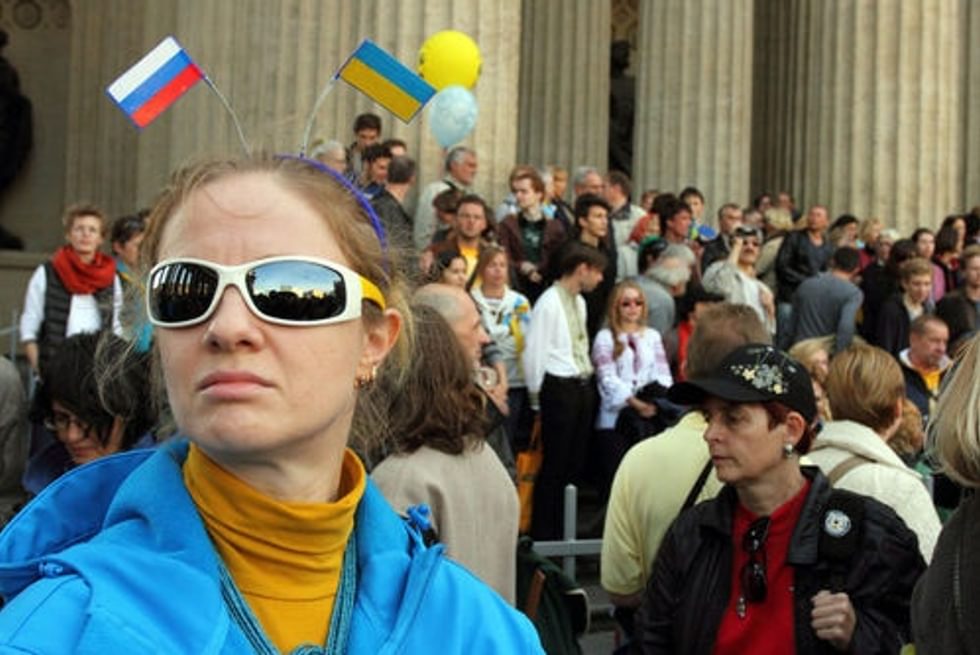
The war in Russia and Ukraine is as much a war of consciousness and ideologies as it is a war of militias with guns, tanks, and Buk missile launchers. While in no way intending to minimize the physical violence of this war, our task as social observers and cultural theorists has been to create space to consider the significance of this war for social relationships and social contracts, political self-images and constructions of country, sovereignty, and the sacred. This war has created conceptual partitions stronger and longer lasting than any border. It has hardened and shattered allegiances. It has been a proving ground for mediated tactics and propaganda strategies, a broad theater to demonstrate authoritarian command. These essays explore the complexity (and tragedy) of what is being done and undone in this war, the ambivalences of lived reality and the intangible forms of chaos being contrived in that reality. They take this war as a “state of exception,” in which legitimation games are both masked and enacted by bare power; as a project which orders complexity into clear and coterminous religious, ethno-linguistic, geographic, and political lines; and as an event where historical nostalgias and social myths are peddled on the cheap. At the same time, these essays capture the everyday refusal of the flattening of memory and social perspective. Can such refusal be sustained in a war of long duration or intensified atrocity? We suspect not. We hope it will not be tested to its limits.
Posts in This Series

Introduction: Ukraine and Russia: The Agency of War
There was no small degree of euphoria among many in Ukraine—and beyond—as protesters created the “EuroMaidan,” which took over Independence Square in central Ki... More

The Maidan as Multitude
The Ukrainian crisis is still in its active phase. I will not try to predict the outcome of events, nor will I concentrate on the analysis of the current situat... More

The Tug of War: Notes From the Battlefield of Reflexivity
It is early summer 2014. We are gathered, by chance and force of circumstance, around a living room table in an apartment building on the concrete outskirts of ... More

How History Goes Wrong: Historical Politics and its Outcomes
Combatants from Eastern Ukraine call their enemy “fascists.” They put signs on their tanks: “To Kiev!,” “To Lviv!”—echoing historical examples of the Red Army s... More

Brother Nation or Brothers No More? Seeing Asymmetry in Post-Maidan Ukraine
“Although I was educated after Independence, my education was a typical Russian-Soviet one. I grew up raised on Russian films, on Russian music, on Russian boo... More

Religion as Politics by Other Means
When popular disgust with corrupt and self-serving governance triggered massive street protests in Kyiv in November 2013, a plethora of religious groups joined ... More

The Ambivalent Future of Ukraine
The situation in Ukraine can be grasped best by a specialist on geopolitics, a scholar of the (il)legitimacy of power, an ethnographer of insurgencies, an analy... More

Ukraine, the Exception, and the Political: Ethnographic Investigations and Theorization
“The exception explains the general and itself. And if one wants to study the general correctly, one only needs to look around for a true exception. It reveals ... More

Crimeastan
His cell phone number is scrawled inside the back cover of my field notebook: Sergey Aksyonov: 098-266-44-53. It’s 2013, and I am piloting a research project I ... More

Bare Power
Anthropologically, one of the most innovative features of Putin’s campaign in Ukraine has been the selective use of un-identified military organizations (UMO). ... More

Revolutions and their Translators: Maidan, the Conflict in Ukraine, and the Russian New Left
Most accounts of the conflict in Ukraine reproduce the familiar Cold War binary. For the Russian government-controlled TV channels, Maidan (Ukraine’s revolution... More